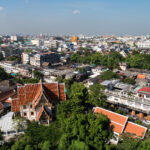Traveling to the Dominican Republic (DR) offers a rich tapestry of experiences, from its stunning beaches and vibrant culture to its historical sites. However, like any international destination, it’s crucial to be aware of local laws and potential safety concerns to ensure a smooth and enjoyable trip. This guide, tailored for U.S. citizens, outlines essential legal information and safety tips to help you navigate your Travel To Dr with confidence.
Understanding Dominican Republic Laws: What U.S. Travelers Need to Know
While exploring the beauty of the Dominican Republic, remember that you are subject to its local laws. Unfamiliarity with these laws is not an excuse, and violations can lead to serious consequences, including expulsion, arrest, or imprisonment. For those considering business ventures or professional practice in DR, it’s imperative to consult with competent local authorities to secure the necessary permits and licenses before commencing operations.
It’s also important to note that certain offenses committed abroad can be prosecuted in the United States, regardless of local law. For detailed information, resources like the crimes against minors abroad section on the U.S. State Department website and the Department of Justice website provide critical insights.
Drug-Related Offenses: Severe Penalties Await
The Dominican Republic enforces strict drug laws. Penalties for possessing, using, or trafficking illegal drugs are severe. Convicted offenders face lengthy jail sentences and substantial fines. U.S. citizens should be acutely aware of these laws and avoid any involvement with illegal substances during their travel to DR.
What To Do If Arrested: Your Rights and U.S. Embassy Assistance
Being arrested in a foreign country can be a daunting experience. If you are arrested or detained in the Dominican Republic, it is vital to request that the police or prison officials immediately notify the U.S. Embassy. The U.S. Embassy can provide assistance to U.S. citizens who are arrested, offering guidance and support. For comprehensive information, refer to the U.S. Embassy’s webpage and general information on legal assistance. Understanding your rights and available resources is crucial in such situations.
Navigating Counterfeit Goods: Be Aware of Local Laws
While counterfeit and pirated goods are commonly found in many countries, including the Dominican Republic, possessing them can still be illegal under local laws. Furthermore, bringing these items back to the United States can result in fines and confiscation. The U.S. Department of Justice website offers further details on the implications of counterfeit goods. Travelers to DR should exercise caution and avoid purchasing or possessing counterfeit items.
Considerations for Specific Traveler Groups
The Dominican Republic is generally welcoming, but specific traveler groups should be aware of particular considerations:
Faith-Based Travel
Faith-based travelers should be mindful of local customs and practices. While religious freedom is generally respected, understanding cultural nuances is important for a respectful travel experience.
LGBTI+ Travelers
The Dominican Republic has no legal restrictions on same-sex sexual relations or LGBTI+ events. For more detailed information, refer to the LGB Travel Information page and the Human Rights report.
Travelers with Disabilities
Dominican Republic law prohibits discrimination against individuals with disabilities. However, enforcement can be inconsistent, and public social acceptance may not be as prevalent as in the U.S. Accessible facilities are limited outside of large resorts and Santo Domingo. Travelers with disabilities should anticipate limited accessibility and plan accordingly.
Students
Students traveling to DR for study abroad or other programs should consult the Students Abroad page and the FBI travel tips for specific advice and safety guidelines.
Women Travelers
Women travelers should review the travel tips for Women Travelers for safety and cultural insights relevant to their travel to DR.
Disaster Preparedness: Staying Informed and Safe
It is highly recommended to register your trip with the U.S. Embassy through the travel registration website before or upon arrival in the Dominican Republic. This registration allows the Embassy to keep you informed in case of natural disasters or emergencies. Information on natural disasters and disaster preparedness in DR is available on the Embassy website. Being prepared for potential emergencies is a crucial aspect of safe travel.
Real Estate Matters: Proceed with Caution
Property rights enforcement in the Dominican Republic can be inconsistent, and real estate investments can be complex. U.S. citizens considering real estate transactions should consult a reputable attorney before signing any documents or finalizing purchases. Legal and physical takeover attempts have been reported, particularly affecting absentee landlords. Purchasing title insurance is advisable to mitigate potential risks.
Scam Awareness: Protect Yourself from Fraud
Scams targeting tourists, particularly elderly individuals, are a concern. Scammers may impersonate law enforcement, attorneys, or U.S. Embassy officials, claiming a loved one’s arrest and demanding money. Always verify such claims directly with the U.S. Embassy or by contacting your family member directly before sending any money. Exercise extreme caution and skepticism when approached with unsolicited requests for financial assistance.
Conclusion: Responsible and Safe Travel to DR
Traveling to the Dominican Republic can be an incredibly rewarding experience. By staying informed about local laws, understanding potential risks, and taking necessary precautions, U.S. citizens can ensure a safer and more enjoyable trip. Responsible travel includes respecting local laws and customs, being aware of your surroundings, and knowing where to seek help if needed. Enjoy your travels to DR while prioritizing your safety and well-being.

